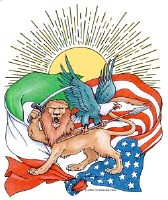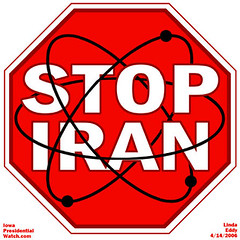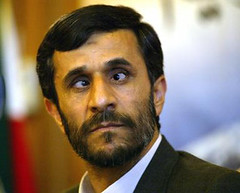Tuesday, October 10, 2006
ISLAM, JEWS & CHRISTIANS
Symposium: Ahmadinejad’s Armageddon
(Best dissertation I have come across - MUST READ) - with occasional comments by me in red)
By Jamie GlazovFrontPageMagazine.com September 4, 2006
The Iranian Mullahs either already have, or will very soon be in possession of, nuclear weapons. (The intelligence community knows Iran already has nuclear weapons and at least four operational nuclear warheads in Shahab 3 nose cones).
This reality is horrifying in the context of Iranian President Ahmadinejad’s verbalized fantasy of annihilating Israel. Part of this fantasy, and also the inspiration for it, is the apocalyptic world vision of Ahmadinejad -- and of many of his co-rulers.
(Ahmadi-Nejad willingly invites Armageddon - contrary to other old guard ayatollahs, who have something to lose, but before dying for his beliefs, he wants the fame - notoriety - of going down in history as the man who destroyed the Jewish/Zionist State of Israel. Like his mentor Ayatollah Taghi Mesbah Yazdi, he is not completely sane ,by secular standards, and talks of the holy halo of light around his head when he first addressed the United Nations and how Allah made everyone speechless and put them in a trance when he spoke to the Assembly).
This vision involves the Islamic Shiite belief in the return of the Hidden Imam, who, according to some, was supposed to have returned on August 22 -- which Ahmadinejad ominously referred to when speaking about Iran’s nuclear ambitions. The date has passed, of course, and no Hidden Imam has yet, arguably, appeared; nor has an Apocalypse, in our literal understanding of it, transpired.
By why did the Iranian president refer to August 22? And who exactly is the Hidden Imam? How and why does his supposed return inspire the nuclear Mullahs’ visions of annihilating Israel and, eventually, the rest of the non-Islamic world? Does Ahmadinejad believe that “speeding things up” in terms of the usage of nuclear weapons will hasten the return of the Hidden Imam?
(For extra focus on the subject, the Hojatieh preach that preventing global misery, sorrow, oppression, suffering and death, delays the return of the 12th Imam Mehdi and is therefore heresy and anti-Islam deserving death as punishment).
To discuss these and other questions with us today, we have assembled a distinguished panel of experts. Our guests today are:
Timothy Furnish, a Ph.D in Islamic History (Ohio State), former U.S. Army Arabic interrogator, and college professor. He is the author of "Holiest Wars: Islamic Mahdis, their Jihads and Osama bin Laden" (Praeger/Greenwood, 2005), as well as a number of articles on Islamic messianism and fundamentalism.
Serge Trifkovic, a former BBC commentator and US NEWS and World Report reporter. His last book was The Sword of the Prophet. The sequel, Defeating Jihad, will be published by Regina Orthodox Press in April. Read his commentaries on ChroniclesMagazine.org.
Robert Spencer, a scholar of Islamic history, theology, and law and the director of Jihad Watch. He is the author of six books, seven monographs, and hundreds of articles about jihad and Islamic terrorism, including Islam Unveiled: Disturbing Questions About the World’s Fastest Growing Faith and the New York Times Bestseller The Politically Incorrect Guide to Islam (and the Crusades). His latest book, The Truth About Muhammad, is coming October 9 from Regnery Publishing.
and
Andrew Bostom, M.D., M.S. (Providence, RI), an associate professor of medicine in the Division of Renal Diseases of Rhode Island Hospital. He has published articles and commentary on Islam in the Washington Times, National Review, Revue Politique, FrontPage Magazine.com, The American Thinker, Investor’s Business Daily, and other print and online publications. He is the author of the book The Legacy of Jihad: Islamic Holy War and the Fate of Non-Muslims.
FP: Timothy Furnish, Robert Spencer, Andrew Bostom and Serge Trifkovic, welcome to Frontpage Symposium.
Dr. Furnish, let’s begin with you. Tell us in the simplest way you can please, who is the Hidden Imam and how does he fit with the Iranian Mullah’s nuclear visions?
Furnish: The Hidden Imam is the Shi`i Muslim version of the Awaited Mahdi, one of two positive eschatological figures in Islamic thought, the other being Jesus. Al-Mahdi means "the rightly-guided one" and is described in many Sunni and Shi`i hadiths (or sayings allegedly going back to Muhammad himself) as coming before the end of time to make the entire world Muslim and establish global justice.
Sunnis believe that the Mahdi will stride onto the world stage for the first time before The End, while Shi`is believe that he has already been here, in the person of one of the descendants of Ali (the cousin and son-in-law of Muhammad, and thus the Muslim prophet's closest male relative).
In the 10th c. CE the last Imam, or legitimate ruler of the Islamic community according to Shi`is (because of Alid descent) disappeared and, it is claimed, went into "ghaybah," or hiding whence he will return. So the major difference between Sunni and Shi`i belief in the Mahdi is that the former say he hasn't come yet, the latter that he'll return. In any event, the UnHidden Imam/Mahdi will create a global caliphate by conquest.
As for 22 August that just passed: that is the date this year that corresponded to 27 Rajab, the traditional date in Islam of Muhammad's mi`raj, or miraculous night ascent to heaven from Jerusalem. Sunni Mahdism, to the best of my knowledge, attaches no special eschatological significance to this date. It would seem that Shi`i Mahdism does, however.
I would be leery of imputing apocalpytic (in the sense of Armageddon-related) motives to the ayatollahs, for in both Shi`i and Sunni eschatology the Mahdi does not destroy the world but makes it right (i.e., Muslim).
(This comment ignores that the influential Iranian ayatollahs are no longer the wealthy, old guard but the neo-Iran, Hojatieh version - under the spiritual leadership of fringe lunatic Ayatollah Taghi Mesbah Yazdi - (nicknamed the Crocodile) - whose fanatical 12th Imam tendencies and teachings were too much for even Ayatollah Rouhallah Khomeini, founder of the Islamic Regime in Iran, to stomach and the Hojatieh were sent into hiding and underground activity).
FP: Well the problem is that destroying the world might be the prerequisite for making it “right,” as the Nazis, Communists and Islamists believe. In other words, the world must be purified by human blood -- earthly paradise can only be built on the ashes of destruction and death.
So does Ahmadinejad believe that he can “speed things up” so to speak in terms of annihilating Israel or whatever other evil lunacy is in his brain? In other words, he and the Mullahs want the Hidden Imam to come back so bad that they think they can hasten his return by perpetrating some kind of mass genocide?
Robert Spencer?
Spencer: Jamie, you're absolutely right that "destroying the world might be the prerequisite for making it 'right'" in this case. The Hidden Imam is, according to Islamic tradition, due to reappear after a period in which the Muslims suffer great persecution and calamity. Muhammad, the Prophet of Islam, said that the Mahdi "will fill the earth will equity and justice as it was filled with oppression and tyranny" (Sunan Abu Dawud, book 36, no. 4272).
The Mahdi will not appear until that oppression and tyranny have for Muslims reached levels unparalleled in human history: as Muhammad also says: "It will be a calamity which, in severity, shall be unprecedented. It will be so violent that the earth with injustice and corruption will shrivel for its inhabitants" (Ibn Hajar, al-Sawa'iq al-muharriqa, p. 161).
It is not beyond the realm of possibility that Ahmadinejad is calculating that he can hasten the coming of the Imam Mahdi by bringing about an increase of what he would regard as oppression of the Muslims - "oppression" that would in reality be a defensive response to an Iranian attack.
All this doesn't mean, of course, that the Iranian government has any such plans.
(Not quite accurate. They have exactly such plans but until their current successful efforts and brinkmanship fail, they are not inthat great of a hurry. Remember, since August 15th, 2005 when Ahamdi-Nejad was "selected" President with the blessings of Supreme Ruler Ali Khamenei (much to his current regret), the government of the neo-Islamic Regime of Iran bears NO resemblance to what was there - good, bad or indifferent - prior to that date. No formulae, human assessments, political givens, common sense factors or any other method of evaluating any government or body of men, still holds water. Or bears resemblance to any accepted logic. Unless you can table Pol Pot's logic and behavior as "acceptable" instead of murderously insane).
While Iranians and other Shi'ites doubtless caught the significance of his setting the date of August 22 to reply to the West's tribute offer, and of his refusal on that date to give up his nuclear program, there are still many ways in which he can act to hasten the coming of the Hidden Imam short of a nuclear attack.
But in light of what pious Twelver Shi'ites believe about the Imam Mahdi, I do hope that American authorities will be monitoring events in Iran very closely over the coming months.
FP: This is a bit confusing. On the one hand, the Koran instructs Muslims to spread Islam all over the world and there exists the overall premise that there cannot be peace until the whole world is submitted to Islam. Yet at the same time there is a prophecy that at the “end times” Muslims will be oppressed and persecuted.
Does this mean that the Koran instructs Muslims to force Islam on the whole world but that it knows that this attempt will fail miserably? Do you get the apparent contradiction I am pointing to here?
In other words, when the Koran propagates spreading Islam by force all over the world, is there a prophecy connected to this propagation (i.e. the assumption that the end times will see great persecution of Muslims) that this effort will fail?
Dr. Trifkovic, can you answer this question while also dealing with who the Hidden Imam is?
Trifkovic: A parallel with this apparent contradiction may be found in orthodox Marxism, testifying to the underlying similarity of these two gnostic creeds. On the one hand, the Party avant-guard was instructed to spread Communist ideology all over the world on the assumption that there could be no end to the misery, exploitation and "alienation" until the whole planet was converted.
On the other hand the class struggle (i.e. "oppression and calamity") was supposed to become ever redder in tooth and claw, to intensify as the world revolution drew nearer, just as "imperialism as the final stage of capitalism" would become ever more aggressive, belligerent, and ridden with contradictions.
In both cases the effort cannot be even imagined to fail, however, because any such notion would make life itself meaningless and therefore intolerable for the initiates. The price of its fruition will be horrendous, however, and the passage through this eschatological shortcut to the End of History unimaginably painful.
The gloomy character of this vision is a strictly Shi'a phenomenon. In the Twelvers' melancholy Weltanschauung, the absence of the Hidden Imam from the world is a tragedy of the highest order for the world.
As for who the Hidden Imam is, there are two answers. Conceptually, Muhammad al-Mahdi, "The Guided One" is the key theological tenet in Shi'a Islam and the cornerstone of its prophetic doctrine. He is mystically anointed to disseminate Muhammad's message to humanity and to redeem a fallen world. Historically, we need to start with the fourth Caliph, Ali, who in Shi'a tradition was the first legitimate successor to the "Prophet".
Ali's position vis-à-vis Muhammad is comparable to that of Aaron vis-à-vis Moses or Peter's to Jesus. Shi'a hold that Ali and all subsequent 11 imams were infallible: they were neither prophets nor Allah's messengers - Muhammad was the last of those, of course - but they nevertheless had an essential function in keeping the world "whole".
On the other hand, all three caliphs before Ali were usurpers who had strayed from the path of Islam and were seduced by power, money, and earthly delights. Their successors, ruling from Damascus, killed Ali's son and successor Husayn, revered as a martyr by all Shi'a Muslims. Those who regard the corrupt early caliphs as "rightly guided," i.e. the Sunni majority through the centuries and to this day, continue to stray.
Eleven imams, in Shi'ite teaching, succeeded Ali on the basis of male primogeniture. The historical record on ten of them is sparse but devoid of overtly mystical elements. The tenth successor and eleventh imam, Hasan al-Askari, left no heir, however, causing Shi'ites to split into several sects.
The dominant one holds that Hasan al-Askari did have a son after all, Abul-Qasim Muhammad (the same name as that of the "Prophet" himself). HE is supposedly al-Mahdi, the twelfth Imam who has been in hiding for the past 1132 years. He is being kept miraculously alive by Allah in a cave and he will return shortly before the Day of Final Judgment, waging war on the forces of evil, ushering in a period of perfect rule, and heralding the end-times.
The believers in this tradition are known as Ithna-Ashari - i.e. "Twelver," or Imami Shi'a - and their sect is commonly treated as synonymous with Shi'ite Islam in general.For as long as the Imam remains hidden, the world is doomed to remain fallen.
Shi'ites are fixated on the end-times and they are on the constant lookout for the signs of the pending return of the Hidden Imam; likewise the Communists saw their own "signs" in 1914, or 1936, or 1941... This obsession shapes not only Shi'as' philosophy of life and culture, but also their politics, and - as attested by Ahmadinejad's idiosyncrasies - their approach to world affairs.
The difference between the upholders of Sunni orthodoxy in Saudi Arabia, say, and Ahmadinejad may be compared to that between Stalin and Trotsky 70 years ago. The Saudis are playing Moscow ca 1950: oppressively conservative at home, while exporting hard-line Party cadres and financing fifth columnists and fellow travelers abroad, in pursuit of a long-term geopolitical project: quiet conquest of Dar al-Harb from within.
One could say that orthodox Sunni Islam is "optimistic," Realpolitik-based, and pragmatic. It expects that the "contradictions" of the West make it ready for quiet demographic and cultural conquest in the fulness of time, and prefers to avoid any overt adventurism that may force the issue before the fruit is fully ripe.
Ahmadinejad, by contrast, shares with Trotsky an apocalyptic world outlook. He favors direct action in pursuit of a permanent Islamic revolution that will pave the way for the return of the Hidden Imam, pave it with blood, sweat and tears.
Indeed he'd like to speed things up, as you point out, and implicitly he hopes to achieve this by twisting the arm of the Almighty - no less so than the cloners of red heifers and would-be re-builders of the Temple hope to do as a means of speeding up the Rapture. The fact that he is more sincere in his beliefs and more earnest in his endeavors than the kleptocrats of the House of Saud are in theirs, is alarming but unsurprising.
He is a visionary; they are Machiavellian cynics.To the other two panelists' comments, with which I agree, I'd add that for us kufr the two faces of the same beast are equally dangerous, albeit in different ways. A slow but deadly cancer and a galloping but potentially equally lethal infection demand different therapies. I don't think anything horrendous will happen next week, but in both cases Knowing One's Enemy is essential for a viable defense strategy.
Bostom: My colleagues Tim Furnish, Bob Spencer, and Serge Trifkovic—spurred by Jamie Glazov’s insightful queries and comments—have presented the overall complexity of the theological framework for Sunni/Shi’a eschatology, and its potential relationship to an Iranian nuclear doomsday scenario. Allow me to highlight a relevant area of emphasis not yet discussed: the centrality of the Jews to Muslim eschatology.
Georges Vajda—in a seminal 1937 essay (Juifs et Musulmans selon le hadit [Jews and Muslims according to the hadith]. Journal Asiatique, 1937, Vol. 229, pp. 57-129.)—provides an overall assessment of the portrayal of the Jews in the hadith collections (the putative words and deeds of the Muslim prophet Muhammad, as recorded by pious transmitters), complemented by Koranic verses, and observations from the earliest Muslim biographies [or “sira”] of Muhammad.
Vajda’s research demonstrates how in Muslim eschatology Jews are described as adherents of the Dajjal—the Muslim equivalent of the Anti-Christ—and as per another tradition, the Dajjal is in fact Jewish.
At his appearance, other traditions state that the Dajjal will be accompanied by 70,000 Jews from Isfahan wrapped in their robes, and armed with polished sabers, their heads covered with a sort of veil. When the Dajjal is defeated, his Jewish companions will be slaughtered— everything will deliver them up except for the so-called gharkad tree.
Thus, according to a canonical hadith, (Sahih Muslim, Book 40, Number 6985), if a Jew seeks refuge under a tree or a stone, these objects will be able to speak to tell a Muslim: “There is a Jew behind me; come and kill him!”
As Vajda observes, not only are the Jews vanquished in the eschatological war, but they will serve as ransom for the Muslims in the fires of hell. The sins of certain Muslims will weigh on them like mountains, but on the day of resurrection, these sins will be lifted and laid upon the Jews.
Hence one can better understand the obsessive fixation on the Jews in both Shi’ite and Sunni eschatology, and the obvious connection to the ongoing jihad being waged to destroy Israel.
FP: This is fascinating. Then what exactly are people talking about when they say that there is no anti-Semitism in Islamic theology? In terms of what is being demonstrated in this conversation, it appears Jew-Hate is a central core of Islam, no?
Furnish: Anyone who says that "there is no anti-Semitism in Islamic theology" is frankly ignorant, on a par with someone who claims that "Islam is (solely) a religion of peace".
As Andrew Bostom just succinctly pointed out, Muslim eschatology has as its main antagonist the Jewish Dajjal and his minions. David Cook points out in his book on Muslim apocalyptic that for Muslims who take their eschatology seriously (and that seems to be a growing number today), "the Jew" is the metahistorical foe, whereas "the Christian" is (merely) the historical one.
So whereas tactical alliances are possible with the latter, they NEVER are with the former.
Also, don't forget, not just traditions and beliefs but Islamic history reflects anti-Jewish activity; Muhammad had the Jewish Banu Qurayzah tribe of Medina liquidated (the men killed, the women and children given away as spoils of war) for allegedly plotting against him. So the pattern of violence against Jews was set by the prophet of Islam himself.I'm not sure that Serge Trifkovic's analogy of the Sunni-Shi`ia split over establishing a global caliphate to the one between Stalin and Trotsky really holds up all that well.
By asserting that "Ahmadinejad...shares with Trotsky an apocalyptic world outlook," and contraposing that to the "optimistic, Realpolitik-based, and pragmatic" view of The Endtimes allegedly held by the Sunni Saudis, Serge leaves out of the equation the fact that many, if not most, of the openly declared and reified Mahdist movements over the last millennium were Sunni ones (Ibn Tumart, Ahmad Barelwi, Sayyid Jawnpuri, Muhammad Ahmad, etc.).
And in fact, the last overt Mahdist movement was the 1979 attempt by Juhayman al-`Utaybi and a cadre of followers to overthrow the KSA government in the name of the Mahdi, his brother-in-law Muhammad al-Qahtani. Now while the Saudi regime of course condemned and repressed this attempted coup, note that a revolutionary Mahdist movement erupted in the heart of Wahhabi Sunnism!
Ahmadinejad may be "visionary," but not all Sunnis are "Machiavellian cynics," as is the Saudi ruling house. Serge seems convinced that Sunni Mahdism can never be as spasmodic or volcanic as that of the Shi`is--but with all due respect, I simply disagree.
Robert Spencer agrees with the analyst Reuven Paz that Ahmadinejad is attempting to "hotwire" the apocalypse. I'm just not convinced of that, perhaps because my research focuses on Sunni movements which, historically, have not ascribed to the doctrine that "destroying the world might be the prerequisite for making it right."
From what I can gather in Arabic books and websites, the Sunni world at least is already convinced the ummah (Islamic community) is already at its absolute historical nadir--so there's no need to increase the oppression of Muslims.
What I am more concerned about is the possibility that Sunni and Shi`i views of the dire straits of the ummah, and the need for the Mahdi/UnHidden Imam to appear, will increasingly converge such that sizable factions of each branch of Islam would be willing to accept a charismatic leader as the Mahdi.
And since I'm convinced that Usama bin Ladin (and several of his sons and a number of senior Al Qaeda operatives), the most charismatic leader in the Islamic world (still outshining Nasrallah), are in Iran being protected by the ayatollahs, there is a very real possibility that UBL could emerge in the near future as the "ecumenical" leader of the jihadist world, both Sunni and Shi`i. And if Tehran has nuclear weapons by then....
FP: Osama in Iran? Yes I have seen some evidence suggesting that. A truly frightening thought of the combination here. In any case, Robert Spencer?
Spencer: Jamie, I'd just like to interject at this point an additional note about Islamic eschatology: I don't think it's quite accurate to say, as Dr. Furnish does, that "for Muslims who take their eschatology seriously 'the Jew' is the metahistorical foe, whereas 'the Christian' is (merely) the historical one.
So whereas tactical alliances are possible with the latter, they NEVER are with the former." If I understand this correctly to suggest that Muslim enmity toward Jews is theologically driven and rooted in the Islamic texts, while Muslim enmity toward Christians is only an accident of history without roots in the Islamic texts, it is only half correct.
A hadith amplifies all this while describing both Christians and Jews as renegades from the truth faith, which is of course Islam:
On the Day of Resurrection, a call-maker will announce, "Let every nation follow that which they used to worship." Then none of those who used to worship anything other than Allah like idols and other deities but will fall in Hell (Fire), till there will remain none but those who used to worship Allah, both those who were obedient (i.e. good) and those who were disobedient (i.e. bad) and the remaining party of the people of the Scripture.
Then the Jews will be called upon and it will be said to them, 'Who do you use to worship?' They will say, 'We used to worship Ezra, the son of Allah.' It will be said to them, 'You are liars, for Allah has never taken anyone as a wife or a son. What do you want now?' They will say, 'O our Lord! We are thirsty, so give us something to drink.'
They will be directed and addressed thus, 'Will you drink,' whereupon they will be gathered unto Hell (Fire) which will look like a mirage whose different sides will be destroying each other. Then they will fall into the Fire.
Afterwards the Christians will be called upon and it will be said to them, 'Who do you use to worship?' They will say, 'We used to worship Jesus, the son of Allah.' It will be said to them, 'You are liars, for Allah has never taken anyone as a wife or a son,' Then it will be said to them, 'What do you want?' They will say what the former people have said.
Then, when there remain (in the gathering) none but those who used to worship Allah (Alone, the real Lord of the Worlds) whether they were obedient or disobedient. (Bukhari, vol. 6, book 65, no. 4581)
In Islamic eschatology, Jesus will set things right at the end of the world. He will return to end the second-class dhimmi status of non-Muslims in Islamic societies - not by initiating a new era of equality and harmony, but by abolishing Christianity and imposing Islam upon everyone.
As Muhammad explained: "By Him in Whose Hands my soul is, surely (Jesus) the son of Mary will soon descend amongst you and will judge mankind justly (as a Just Ruler); he will break the Cross and kill the pigs and there will be no Jizya (i.e. taxation taken from non Muslims)" (Bukhari, vol. 4, book 60, no. 3448).
Another tradition puts it this way: "He will break the cross, kill swine, and abolish jizyah. Allah will perish all religions except Islam" (Sunan Abu Dawud, bk. 37, no. 4310). And yet another hadith has Muhammad saying: "How will you be when the son of Mary (i.e. Jesus) descends amongst you and he will judge people by the Law of the Qur'an and not by the law of Gospel" (Bukhari, vol. 4, bk. 60, no. 3449).
All that said, it is true that Christians are not portrayed in the Qur'an as the crafty, invidious, and inveterate enemies of the Muslims that the Jews are, so Cook and Furnish are generally correct that Muslims may consider tactical alliances with Christians possible - and there are many historical instances of this - but not with Jews.
But there is a "metahistorical" element to the Islamic critique of Christians and Christianity, and thus such accords when they are made will always be temporary, and will never replace Islamic triumphalism and supremacism.
This is a fact that the leaders of Western states, which are still thought of as Christian in the Islamic world, would do well to bear in mind.
Trifkovic: My analogy to Stalin vs. Trotsky re. Uncle Joe was clearly related to the KSA "Wahhabism Central," which right now is indeed Machiavellian and "optimistic," and not to Sunni Mahdism, which is apocalyptic.
The Meccan fifth column in the West -- thousands of KSA- financed mosques and Islamic centers -- are busy spreading the message that there must be no terrorism and no threats, lest the hosts belatedly wake up to what's going on.Of course many of the Mahdist movements have been Sunni, but they are temperamentally and ideologically opposed to the royal kleptocrats' approach, and -- many theological differences notwithstanding -- inherently sympathetic to Ahmadinejad's mindset.
Far from being "convinced" that Sunni Mahdism can never be as spasmodic or volcanic as that of the Shi'is, I can see it forging an alliance with the Armageddonists in Tehran.
Hence I agree with Furnish's conclusion that the two may converge, and I wouldn't find UBL's presence in Iran shocking at all.
On Islam's anti-Semitism, the Nazi connection is important. My article Islam’s Nazi Connections is interesting because in both cases "the Jew" is an essential ingredient of an initiate's self-definition.
Historically, however, Jews were often treated more favorably than Christians (notably in Ottoman Turkey) because they did not have an external source of hope, inspiration and potential support -- and back then "Christendom" still had some meaning.
But back to our topic. Ahmadinejad's millenarianism notwithstanding, in the short term I don't expect anything spectacular because he is holding a strong geopolitical hand.
The de facto Hizballah victory, embodied in UNSC1701, has made it clear that Iran has the wherewithal to make a very tangible impact on events in the greater Middle East, including Iraq, where Iranian agents have been long infiltrated into the security services, and most notably the Interior Ministry.
If the US is serious about pursuing sanctions, the Iranians may press a few buttons that would make an already difficult situation in Iraq totally unmanageable.
Iran has no incentive to comply right now, because if it did, it would not obtain what it really wants: direct negotiations with the U.S. that would result in some kind of security guarantee. A serious package of sanctions would have to include sanctions on Iranian oil exports and on Western investments into the Iranian oil industry. If there was no Iranian production on line, we'll see $100+ a barrel within days, which could trigger off a global economic recession.
(Left out of the oil equation is the financial weapon of Iran's attempt to unhook oil from the Dollar to crash it. Nobody believes that the Iranian Oil Exchange being set up by Ahmadi-Nejad could succeed, but analysts fail to realize that success (profit) in terms understood by the West are not the measure of Ahamadi-Nejad. His success comes with crashing the global economy and causing apocalyptic distress, hunger and misery. After all, he owns little or nothing, never has, can always continue to have his morning bread, cheese and tea for breakfast and his daily stew dish for lunch or dinner, regardless if the rest of the world disappears into the abbyss of starving millions. Plus he has a valuable barter commodity to use when money no longer has a value).
In extremis he may even close the Straits of Hormuz, but he won't do it for as long as his diplomatic arsenal remains unexhausted. The question is whether it is at all possible to include Iran in a long-term, constructively devised new architecture of the greater Middle East, on view of Ahmadinejad's messianic perception of himself; but in the short term he's proven himself to be a remarkably "rational" player in the diplomatic game.
Bostom: I just wanted to follow-up on Serge Trifkovic's discussion. The paradigm Serge outlined wherein Jewish dhimmis may have faired somewhat better than their Christian dhimmi counterparts (i.e., in the Ottoman Empire) clearly did not, and does not hold in Shi'ite Persia/Iran.
An ethos of Jew-hatred, including paroxysms of annihilationist fanaticism, has pervaded Persian/Iranian society, almost without interruption (i.e., the two major exceptions being the period of Sunni Afghan invasion and rule from 1722-1794, and Pahlavi reign, with its Pre-Islamic revivalist efforts, from 1925-1979), since the founding of the Shi’ite theocracy in 1502 under Shah Ismail, through its present Khomeini-inspired restoration, since 1979 (reviewed here).
Having returned their small remnant Jewish community to a state of obsequious dhimmitude, Iran’s current theocratic rulers focus most of their obsessive anti-Jewish bigotry on the free-living Jews of neighboring Israel.
Holocaust scholar Daniel Jonah Goldhagen has argued persuasively that the Nazis melded centuries of annihilationist Jew hatred to a state machinery capable of implementing the systematic, mass murder of Jews. Former Iranian President Rafsanjani’s December 2001 “Al Quds Day” sermon threatened, explicitly, the nuclear annihilation of this largest concentration of autonomous Jews in history—the Jewish State of Israel.
Ahmadinejad has reiterated these threats repeatedly as Iran’s nuclear ambitions near fulfillment. Four centuries of Jew hatred in Shi'ite Iran, inspired by "najis" and other Islamic motifs, accompanied by pogroms, forced conversions, and other less violent, but continuous forms of social and religious persecution, surely meets Goldhagen's Nazi standard of an established "annihilationist" mentality.
Iran must not be permitted to acquire a nuclear weapons capability, certainly now, under the current apocalyptic Shi’ite religious fanatic Ahmadinejad, and into the foreseeable future.
Furnish: Robert Spencer is of course totally correct that Islamic animus towards Christians has deep roots in the theology.
But that was historically tempered by the different experience the expanding Islamic state had with its Christian rivals, most formatively the Byzantine Empire, and that influence is still evident in Mahdist writings today (at least in the Sunni Arab ones).
For example, some modern works on Mahdism posit a global alliance between the Christian West and the Islamic world--even perhaps between the West and the Mahdi's forces, once he arrives on the scene!--against Yajuj and Majuj (Gog and Magog), often envisioned as the Chinese (and sometimes Russians) and/or against the forces of the Dajjal!
In such scenarios, it is only after the evil forces of the East are defeated that the West then turns against the Mahdi and his Muslim followers, whereupon he (of course) defeats the disloyal Christian world. So hudna, or even temporary alliance, with Western Christian powers is a possibility, whereas Jews are always seen (as Robert acknowledges) as misguided at best and evil at worst.
I discovered a fiendishly original reinterpretation of Daniel 11 in some modern Mahdist books (the "king of the south" passages, describing an evil ruler who will "desecrate the Temple" and "set up the abomination that causes desolation").
Mahdists today (at least the Sunni ones) refer to this figure as "the Zionist Mahdi" (mahdi al-Sahyuni), actually the Dajjal whom Jews will follow instead of the true Mahdi.
Dislike of "the Jews" of course includes, in Islamist and Mahdist circles, Ataturk for his dissolution of the Ottoman caliphate. Ataturk is often accused of being a "Donme," a descendant of those Jews who followed the 17th c. Jewish leader Sabbatai Sevi from Jewish messianism into Islam.
Also, the "Zionists" are excoriated for (until recently) their de facto alliance with Turkey, and for their undermining of Islam by way of allowing the world headquarters of Baha'ism sanctuary in Israel.
Sunni Mahdists seem to be conflicted about how to view Iran, especially since the Islamic Republic was established there.
On one hand, the revolution there is seen as a beacon of hope for Islamists everywhere; on the other hand, it has inspired false mahdis (like the al-`Utaybi uprising of 1979 in KSA) and, more importantly, it's suspect because it represents but the latest Shi`i resurgence going back to the Safavids and their wars with the Sunni Ottomans.
But as I remarked earlier, I think that this jaundiced view of Iran and it's Shi`ism is being overshadowed today by the ecumenical tendency within Islam that sees the Sunni-Shi`i divide as far less important than uniting against the common enemy: the West in general and the U.S. in particular.
Serge Trifovic is totally correct that Mahdist movements "are temperamentally and ideologically opposed to the royal [Sa`udi] kleptocrats' approach...." The al-`Utaybi coup d'Mahdi had as its gravamen the allegedly non-Muslim behavior and rule of the Saudis.
He and I are in total agreement that eschatologists there could overcome their Wahhabi distaste for Iranian Shi`ism and heed a Mahdist call coming from there.
(Needs a mention here that there is a sizeable contingent of Shia Moslems in Saudi Arabia, who have recently become vocal and activist against the Wahhabi dictates of the country. In an almost unbelievable fashion, they have come out into the streets with sizeable anti-government rallies).
To back up what Andrew Bostom says about the strong anti-Jewish strain of Iranian Shi`ia thought: even Sunni Mahdist works in recent decades have described the Islamic Revolution in Iran as necessary to save Iran from the nefarious influence of "Jews and foreigners."
In terms of how the Iranians at the highest levels take the belief in the return of Awaited Mahdi, a conference taking place next week in Tehran is an excellent example.
Spencer: Dr. Furnish is correct about the possibility of a Muslim/Christian hudna compatible with Shi'ite eschatology and based on the theological foundations that have been explained here.
Christians tempted by such offers should examine that eschatology in its fullness, and beware.
Trifkovic: In its English-language "call for papers," the aforementioned conference in Tehran calls Durkheim "Durkim," Marx is "Marks," Augustine is "Egustin," Rene Guenon became "Geneon," and Hans Kueng is "Hance Koung".
That level of the knowledge of, and respect for, the Western intellectual and spiritual tradition among Iran's contemporary ideologues and "theoreticians" of Mahdism is telling.
FP: Timothy Furnish, Robert Spencer, Andrew Bostom and Serge Trifkovic, thank you for joining Frontpage Symposium.
Click Here to support Frontpagemag.com.
Subscribe to:
Post Comments (Atom)














No comments:
Post a Comment